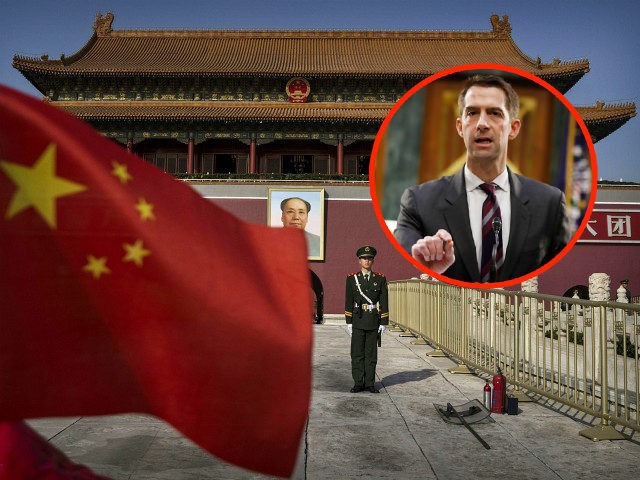Sen. Tom Cotton (R-AR) has released an 80-page report, “Beat China: Targeted Decoupling and the Economic Long War,” which, along with other key documents, could serve as a guide for Americans as they think about how to compete with China.
Cotton’s report envisions a Cold War against China—that is, a patient economic, strategic, and ideological struggle to beat China without firing a shot—not an actual hot war. After all, we won the Cold War against the Soviet Union after five decades; today, the Arkansas lawmaker believes, we can do it again in Cold War 2.
Yet to sustain this new new cold war, Cotton notes, we need structural change here at home:
Current U.S. federal government organization is not optimized to thwart China’s whole-of-society approach to the economic long war. This has led to serious gaps in the performance of U.S. institutions, which today punch well below their weight, even given the positive reforms and initiatives of the past few years.
In that last line, can observe Cotton’s tip of the hat to the Trump administration—“positive reforms and initiatives of the past few years”—even as his document maintains a sense of urgency about the future: There’s a lot more that still needs to be done.
Yet Cotton also has history firmly in mind; he points to the National Security Act of 1947, one of the foundational reforms of Cold War 1, as a valuable template for action. It was that legislation that reorganized the Pentagon, creating a new and independent U.S. Air Force, as well as setting up the Central Intelligence Agency.
Surveying the situation at present, Cotton works his way through a long list of issues and concerns, highlighting the need for a comprehensive national strategy on trade, investment, and intellectual property (IP). He notes, for instance, that documented cases of Chinese IP theft in the U.S. have soared 1,300 percent in the last decade; the IP loss to America totals in the hundreds of billions, if not trillions, of dollars.
,Furthermore, Cotton zeroes in on sectors that have been targeted by China, including U.S. higher education—both bribed and compromised, he believes—and then focuses on unmet needs, concerning the supply of crucial rare earth elements, the construction of 5G broadband, and the safe development of artificial intelligence.
And as to solutions, he puts the focus where it belongs: applying a Hamiltonian emphasis on protecting and promoting our ability to make vital wares here at home. For those who wish to dig deeper into these topics, Cotton provides no fewer than 326 footnotes.
Yet here we might pause to observe that the senator puts great emphasis on some subjects, and yet not enough on others. For instance, he mentions “Hollywood” 28 times, focusing on the American entertainment sector’s unseemly eagerness to censor itself, worldwide, in pursuit of the China market and Chinese investment. And yet at the same time, “religious freedom” goes unmentioned, as do China’s oppressed Christians, or the even more oppressed Muslim Uyghurs, or the unlucky followers of the Falun Gong spiritual movement.
Nobody should think of Cotton as anything other than a staunch champion of religious freedom, including in communist regimes, and yet the inclusion of faith as a matter of concern—and as a point of leverage—would have made this document even stronger.
No doubt Cotton will have more to say about China and freedom, including religious freedom, in the future. In the meantime, this report—the old-fashioned term for which would be white paper—ends on a powerful note:
By putting national security concerns at the forefront of our economic contest with China, strengthening our industrial base and supply chains, and better coordinating and protecting our nation’s research enterprise, America can create the government infrastructure it needs to properly utilize its vast capabilities and triumph in the long economic war.
Fortunately for America, Cotton is not alone in raising concerns about China and calling for a stronger policy toward that totalitarian communist-capitalist regime. Two years ago, for instance, this author took note of another muscular report on the China threat, that one from Sen. Marco Rubio.
Indeed, concern about China is spreading widely. Just on February 24, The Atlanta Journal Constitution reported on the efforts of four Georgia Congressmen to persuade the Carter Center—the non-profit founded, of course, by former president Jimmy Carter—to cease and desist its cooperation with Chinese-government front groups. The Carter Center, to be sure, is hardly unique in playing PRC-funded footsie; such cooperation with Big Panda has occurred all over the U.S., and while it may be legal, it’s surely wrong.
Interestingly, the four Georgia lawmakers taking on this cause—Buddy Carter, Drew Ferguson, Jody Hice, and Austin Scott—are all members of the House Republican Study Committee, which, under the energetic leadership of Rep. Jim Banks of Indiana, has staked out an ambitiously hawkish position on China.
So we can see: A new movement is afoot, as America First becomes the Defense of America—in conjunction, hopefully, with likeminded allies around the world.
Nobody wants a hot war with China, and nobody should think that the Chinese people themselves are the enemy. Yet the Chinese Communist Party (CCP) led by Xi Jinping, is a threat, and so we must to wake up to that threat. Today, the CCP is sending its nasty tentacles around the world, much as the Soviet Union’s communist party was doing eight decades ago.
For the time being, the Biden administration and the Democrats have the power in Washington, D.C., and so we’ll have to see how they choose to to deal with the threat from China.
Hopefully, current Democratic leaders will stand strong. Yet if not, then, by the necessity of national security, the torch will be passed to a new generation of Republican leaders. And Army veteran Tom Cotton, who delivered a strong message on security–at home and abroad–to the Conservative Political Action Conference on February 26, stands to be at the forefront of this new guard.

COMMENTS
Please let us know if you're having issues with commenting.